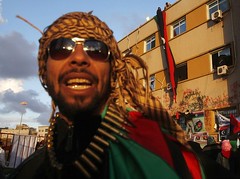Islamists Destroy Timbuktu, Eye Pyramids of Giza
/Ayanna Nahmias, Editor-in-ChiefLast Modified: 19:20 PM EDT, 11 July 2012
 Unfortunately, radical Islamist behaving badly has dominated the news this week. This coupled with a dearth of response from moderate Muslims who should vociferously denounce these fringe groups that have hijacked their religion, has provided fertile ground for anger, mistrust, and xenophobia.
Unfortunately, radical Islamist behaving badly has dominated the news this week. This coupled with a dearth of response from moderate Muslims who should vociferously denounce these fringe groups that have hijacked their religion, has provided fertile ground for anger, mistrust, and xenophobia.
Today, news outlets reported the horrific possibility that Egypt’s greatest historical treasure and defining landmark is under threat of destruction. Prominent, radical Muslim clerics are demanding the newly elected President Mohammed Morsi push Egypt toward theocratic governance. As proof of his compliance the clerics are demanding that he impose Islamic law in Egypt just like the newly formed northern Sudan government did.
It is perhaps fortunate that President Morsi is making his first foreign trip today to Saudi Arabia, and thus has been spared the ordeal of addressing these ludicrous demands. The radicalization of his government could play directly into the hands of the military who recently dissolved parliament and would use this or any other opportunity to reassert their dominance.
At issue today is the call by top, radical, Muslim clerics for Morsi to demonstrate his fealty by instituting a program to destroy the last of the Seven Wonders of the Ancient World - namely, the Great Pyramids of Egypt, the Sphinx, and all others symbols and representations that they deem pagan and ‘idolatrous.’
The Seven Wonders of the Ancient World have all been destroyed. The Hanging Gardens of Babylon, the Statue of Zeus at Olympia, the Colossus of Rhodes, and the Great Lighthouse of Alexandria were all believed to have been destroyed by earthquakes. The Temple of Artemis at Ephesus as well as the Mausoleum of Halicarnassus were destroyed during war. Only the Great Pyramids of Giza remains.
The call for the destruction of these significant, historical antiquities by marauding conquerors is not new, but what is disturbing is that in this instance Egyptian are seeking to destroy their national heritage. The fact that these demands were made is a clear sign of the diminished capacity of moderate Muslims to keep the radical fringe in check, which in turn provides ammunition to those who seek to engage in an apocalyptic end of day’s battle between the West and Islam.
Though the destruction of the Pyramids of Giza is unfathomable, the necessary technology can be procured easily by radical Islamist. If they are successful in convincing the Morsi government to destroy the pyramids, there is little that any other nation could do to stop this unconscionable act.
On 9 June 2012, in Mali, Ansar Dine Islamist militia which has ties to Al-Qaeda and fought with the Tuareg to capture the key towns of Timbuktu, Gao and Kidal, have begun to impose Sharia law on the populace in the region with the hope of eventually instituted this as the rule of law for the nation.
The Tuareg who are more moderate but fought with Ansar Dine against the military forces of the deposed Malian president Amadou Toumani Touré, have broken ties with the group because they do not ascribe to their strict interpretation of the Quran. Unfortunately, they have unwittingly delivered control of the region into the hands of what some have reported is an organization comprised of criminals and drug lords.
According to reports Ansar Dine Islamists routinely engage in pillaging, rape, and theft in the areas they have conquered. They have also actively desecrated a number of centuries-old mausoleums of Muslim holy men in Timbuktu. The tombs are located at the great Djinguereber mosque, and this sacrilegious act perpetrated under the guise of piety is nothing short of hypocrisy.
In March 2001, Taliban fighters used explosives to blow up the famed 6th century giant statues of the Buddha in Afghanistan’s Bamiyan province, and in both instances the extremists’ leaders, Mullah Mohammed Omar in Afghanistan, and a spokesman for Ansar Dine lauded the destruction of these irreplaceable monuments.
“Muslims should be proud of smashing idols. It has given praise to God that we have destroyed them.”
There is no better time in history for moderate Muslims to take a stand and let their voices be heard. As Edmund Burke said, “When bad men combine, the good must associate; else they will fall, one by one, an unpitied sacrifice in a contemptible struggle.”
Thus, it is imperative that every voice of moderation speak out or risk being tarred by the same brush used by generalists to justify racism, hate crimes, xenophobia, and distrust of not only Muslims, but of all people who do not conform to ‘their’ perception of the world.
As George Santayana stated, “Those who do not remember history are condemned to repeat it.” If we do not stand against this wanton destruction and radical extremism by deploying every means possible, we will surely find ourselves locked in another world war. This time, not with Fascist or Nazis, but with unpredictable, undisciplined, uneducated, radical Islamist; and in the end the collateral damage of this type of engagement will leave no country unscathed.
Follow Nahmias Cipher Report on Twitter Twitter: @nahmias_report Editor: @ayannanahmiasRelated articles
- Islamic Militants Destroy Historic Sites In Timbuktu While Muslims Leaders Call For Destruction Of Egypt's Pyramids (jonathanturley.org)
- Islamists call for the destruction of the pyramids (americanthinker.com)
- News & World Events - Re: Calls to Destroy Egypt's Great Pyramids Begin (disclose.tv)
- Raymond Ibrahim: Calls to Destroy Egypt's Great Pyramids Begin (ifaynsh.wordpress.com)















































